
News -
Prosthetic and orthotic service in developing countries
How well do prosthetic and orthotic services work in countries characterized by poverty and civil war? Lina Magnusson, who last Friday became the first female Swedish prosthetist/orthotist with a PhD, wrote her dissertation on this topic.
“The supply of prosthetic and orthotic devices are affected by poverty and by cultural issues, such as attitudes towards people with disabilities. In order to improve services in developing countries, we need to identify obstacles and also factors that would facilitate the supply of prosthetic and orthotic devices. That's what I have done in my dissertation”, says Lina Magnusson.
Lina conducted her studies in Malawi, Sierra Leone and Pakistan. The results show that patients were generally able to walk on level ground but more than half had difficulties walking on uneven ground, climbing stairs and going up or down hills. Patients in Malawi were more satisfied with the prosthetic and orthotic services provided than patients in Sierra Leone. In Sierra Leone, men were more satisfied than women in how the device affected their personal mobility and in their experience of the service.
“After having gone through the statistics available and reviewing handwritten patient records, I would estimate that approximately 20-25 percent of those who need prosthetic and orthotic services in Malawi and Sierra Leone have access to it. Of those, the majority of patients were using their prostheses or orthotic devices, although about half of the devices were broken and in need of repair. More than one third of patients also reported pain and wounds when they used their device”, says Lina Magnusson.
Lina Magnusson’s dissertation also shows that those working with provision of prostheses and orthoses experienced an inability to deliver high quality service. One obstacle is the government's ignorance and failure to prioritize rehabilitation services. The results also indicate that training for prosthetists/orthotists and prosthetic and orthotic technicians must be improved. The majority of developing countries, including Sierra Leone and Malawi, offer no formal prosthetic and orthotic education. The result of this is a shortage of trained personnel.
Lina Magnusson successfully defended the thesis Prosthetic and Orthotic Services in Developing Countries on the 7th of November 2014 at 13:00, School of Health Sciences.